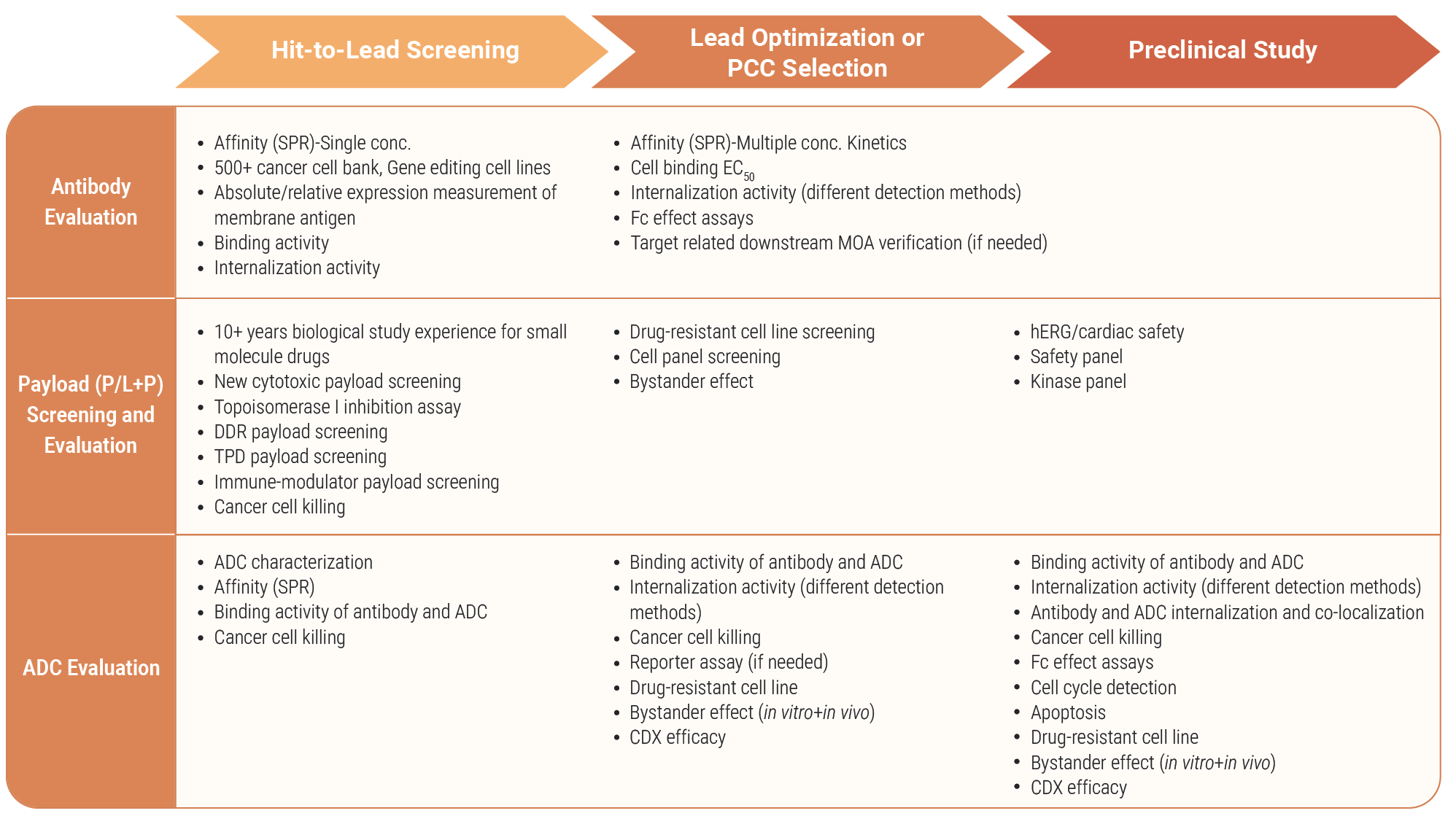
Our Payload Screening and Profiling service is designed to identify and evaluate the most effective cytotoxic agents for Antibody-Drug Conjugates (ADCs). We focus on screening a wide range of payloads, including DNA-damaging agents, tubulin inhibitors, and novel payloads like protein degraders, immune modulators, to ensure optimal efficacy and safety for targeted cancer therapies.
Biochemical Activity Profiling: We use assays like Topoisomerase I–mediated DNA relaxation to evaluate how payloads biochemically disrupt essential cellular processes.
Cellular Mechanism Analysis: Through flow-based cell cycle arrest assays, apoptosis assays and high-content tubulin polymerization assays, we analyze how payloads impact cell division and induce cancer cell death.
Cancer Cell Panel Screening on Single and Combination Payloads: We evaluate the efficacy of single payloads and explore the synergistic effects of combination payloads, aiming to identify the most effective therapeutic strategies.
Innovative Payload Discovery: Our platform screens for novel payloads with unique mechanisms of action, supporting the development of next-generation therapeutic strategies.
- DDR Inhibitors as ADC Payloads: We offer comprehensive screening services designed to identify and evaluate DNA Damage Response (DDR) inhibitors that can effectively target and kill cancer cells by exploiting their reliance on DNA repair pathways. Learn more...
- TPD Agents as ADC Payloads: Our targeted protein degradation (TPD) payload screening service is particularly aimed at addressing challenging cancer targets that are otherwise undruggable. Learn more...
- STING Agonists as Immune-Activating Payloads: By incorporating STING agonists as payloads, STING-ISAC can activate a robust immune response directly within the tumor microenvironment. We offer comprehensive screening services for both STING agonists and STING-ISAC.

Topoisomerase I (Topo I) is a crucial enzyme in DNA replication and transcription processes, responsible for alleviating torsional strain in the DNA helix by inducing single-strand breaks and re-ligation. The Topoisomerase I–Mediated DNA Relaxation Assay is used to assess the ability of an ADC’s payload to inhibit Topo I, thereby preventing the re-ligation of the DNA strands. This assay helps in determining the potency and effectiveness of the payload as a Topo I inhibitor. Contact us for more detailed reference data.
We offer tubulin polymerization assays utilizing both absorbance-based and fluorescence-based methods. These assays are designed to evaluate the efficacy of ADC payloads in disrupting microtubule dynamics, providing critical insights into their potential as anticancer agents. Contact us for more detailed reference data.
Cell cycle arrest assays are critical in evaluating the efficacy of ADCs, specifically in understanding how the cytotoxic payload affects the proliferation of cancer cells. The principle is to determine the ability of an ADC's payload to disrupt the normal progression of the cell cycle, causing the cancer cells to stop dividing and eventually die. This disruption typically occurs at specific phases such as G1, S, or G2/M, depending on the mechanism of action of the payload. Contact us for more detailed reference data.
Flow cytometry analysis allows for the quantification of apoptotic cells in a population based on changes in cell size, complexity, and membrane asymmetry. In this case, Annexin V FITC-A and PI-PE-A are used as markers for apoptosis. Annexin V binds to phosphatidylserine, a molecule that is translocated from the inner to the outer leaflet of the plasma membrane early in apoptosis. PI (Propidium Iodide) is a nucleic acid-binding dye that is impermeant to live cells and early apoptotic cells, but stains late apoptotic or dead cells. Contact us for more detailed reference data.
Learn more:
Antibody/ADC In Vitro Screening and Evaluation
We value your inquiries and are here to provide you with tailored solutions for your drug discovery and development needs. Whether you have questions, require more information, or are interested in discussing potential collaborations, our team of experts is just a message away.
Feel free to reach out to us.